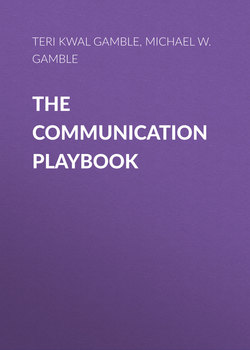Читать книгу The Communication Playbook - Teri Kwal Gamble - Страница 186
На сайте Литреса книга снята с продажи.
Labeling: Mixing Up Words and Things
ОглавлениеSometimes we forget that people, not words, make meanings. When this happens, we pay too much attention to labels and too little attention to reality. We can approach this phase of our study of meaning by considering the problem of labels and how strongly they influence us.
How important are labels in our culture? Consider this: A judge ruled that an individual could not change his name to a number because doing so would be totalitarian and an offense to human dignity. What does a number, as opposed to a name, signify? Would we change if our names were changed?16
We display an intensional orientation when we let words or labels fool or blind us. When we focus on what a label really represents, we display an extensional orientation.
Our name-brand society is a testament to the power of labels to alter perceptions of value. Recent tests, demonstrating how advertising can trick the taste buds of young children, revealed that anything tastes better to them—even carrots, milk, and apple juice—if wrapped in paper with the McDonald’s label. Labeling is known in marketing jargon as branding and appears to have the ability to physically alter perceptions of taste.17
Career Builder: “The Name Game”
In your opinion, could your name have anything to do with your chances of succeeding in your chosen career? Could the appellation used to represent a group function similarly?
What does a name do? Your name identifies you. It also distinguishes you from others. Your name is part of your identity. The question is: Does a name reveal any other pertinent information? The fact is that others will make assumptions about us based solely on our names.
Names have been shown to influence whether or not an employer chooses to interview or hire a potential employee. Such implicit bias is particularly harmful to people with unusual sounding names, especially non-Whites.18 Passing judgment on someone’s potential to succeed based solely on her or his name is one harmful name-game effect.19
Another harmful name-game effect involves having a name that stereotypically matches the gender of the job for which you are applying. Some first names, for example, suggest your sex and ethnicity and even perhaps your age and personality. College students demonstrated their own implicit bias when asked to predict what careers job applicants with feminine- and masculine-sounding names were most likely to succeed in, indicating that those with masculine-sounding names would most likely be successful in stereotypically masculine occupations such as plumbing and construction, as compared to predicting success in the nursing or child-care field for those who had feminine-sounding names.20
1 Why do we place such a premium on names?
2 To what extent, if any, have you found your reaction to a person shaped by his or her name?
3 What if your own name is an unusual one? How do you imagine it will affect your career opportunities and success?
4 What if you’re not applying for a position that is associated closely with your gender? Would you change your name or use just your first and middle initials in lieu of your whole name on your application?
5 Do you believe that if you altered your name and it was discovered by others that they would view you as competing fairly or cheating? Why?
6 What do you see as a viable solution to the name game?
In the effort to avoid such gender effects, genderless words are increasingly substituted for gendered ones, including Latinx (representing anyone in North America with roots in Latin America—male, female, or gender-nonconforming) and Chicanx (representing anyone of Mexican descent). Some prefer using these words in place of the masculine Latino and Chicano because they see them as a means of removing the machismo in the culture and the language, as well as a means of empowering others.21
